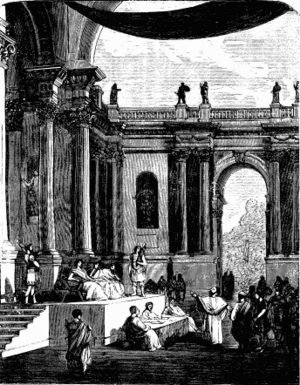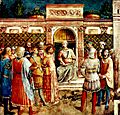Persecution of Christians in the Roman Empire facts for kids

In the ancient Roman Empire, followers of Christianity faced difficult times. They were often treated unfairly and punished just for their beliefs. This happened from the 1st century AD until the 4th century.
The Roman Empire originally believed in many gods, following Roman paganism and Hellenistic religion. But as Christianity began to spread, it caused problems with the Roman way of life. Christians believed in only one God. This meant they could not worship the Roman emperors or other gods, which was a big part of Roman society.
Romans saw Christians as disloyal. They were accused of various things, like meeting in secret or bringing in a new, strange religion. The first local persecution happened under Emperor Nero (54-68 AD) in Rome. Later, a wider persecution took place during the rule of Marcus Aurelius (161-180 AD).
After a quiet period, the unfair treatment started again under Emperors Decius (249-251 AD) and Trebonianus Gallus (251-253 AD). The persecution by Decius was especially widespread. Emperor Valerian (253-260 AD) also persecuted Christians, but this stopped when he was captured by the Sasanian Empire during a battle. His successor, Gallienus (253-268 AD), then ended the persecutions.
The last major persecution of Christians began under Emperor Diocletian (283-305 AD). It continued in some parts of the empire until Emperor Galerius (310-313 AD) issued a special order called the Edict of Serdica. After Constantine the Great (306-337 AD) won a big battle in 312 AD, he and his co-emperor, Licinius, issued the Edict of Milan in 313 AD. This important order allowed all religions, including Christianity, to be practiced freely throughout the empire.
Contents
Roman Religion and Society
At the start of the Roman Empire, Roman religion involved worshipping many gods and goddesses. Each city had its own gods, often based on those from ancient Greece. This public religion was deeply connected to Roman life and politics. Being Roman meant taking part in these religious practices.
Over time, some Romans felt that their traditional religion was losing its meaning. Wars and political changes also played a part in this decline. This led people to look for other ways to express their faith. They turned to things like worshipping the emperor, joining mystery cults, or following new religions from the East, including Christianity.
The Roman Empire was generally open to new cultures and even new gods. However, this openness had limits. Romans usually accepted foreign gods if they were worshipped "according to ancestral custom." Christians were seen differently because they seemed to abandon their Jewish roots.
How a religion was practiced also mattered. Roman officials were suspicious of groups that met at night, in secret. They linked these private gatherings to treason or plots against the emperor. For example, the worshippers of Dionysus faced problems in 186 BC because their rituals happened at night. Their leaders were arrested, and strict rules were put in place.
This pattern was often repeated for other groups seen as a threat. Over time, astrologers, philosophers, Jews, and followers of the cult of Isis were sometimes expelled. Druids and Christians also faced similar treatment.
Why Christians Were Persecuted
People have debated for a long time why Romans persecuted Christians. One idea is that there was a specific law across the empire that banned Christianity. Some think Emperor Nero started this. This law might have come from an older Roman rule that made it a serious crime to introduce a new religion without the state's permission.
Another idea is that Roman governors punished Christians to keep order. They saw Christianity as a foreign religion that made people abandon traditional Roman ways. This was seen as disloyalty to the Roman state.
A third idea suggests Christians were punished for specific crimes. These included practicing magic, holding illegal meetings, or treason. Treason was a common charge because Christians refused to worship the Roman emperor as a god. While rumors about Christians were common, this idea has less evidence than the others.
Clashing Beliefs
The main reason for persecution was a clash of ideas. Romans believed their emperor was divine, like a god. Christians, however, believed in only one God and could not worship the emperor. This meant that the loyalty Christians felt for Christ went against the loyalty Romans expected for Caesar.
Because of this, Christians lived under constant threat. It was hard for them to hide their faith. Their beliefs required them to live differently from others. They had strict moral rules and tried to avoid things linked to pagan gods.
For example, Christians often avoided public festivals, games, and plays. These events were usually held in honor of pagan gods. Many jobs, like military service or making idols, were also seen as against Christian principles. This made Christians seem anti-social and disloyal to Roman society.
Private Worship and Rumors
Christians often met in private homes or shops, away from public view. This was unusual for Romans, who saw religion as a public event. Meeting in secret made Romans suspicious. Rumors spread that Christians committed terrible crimes, like eating the "blood and body" of Christ, which was misunderstood.
Welcoming Everyone
Early Christian groups were very open. They welcomed people from all social classes and backgrounds. Women had a more important role than in other religions at the time. Christians were taught to love everyone, even their enemies. They called each other "brother" and "sister."
This openness was seen as a threat by some Romans. They worried it would disrupt their traditional society, which was based on class and gender.
Refusing Paganism
Many Romans believed that bad things would happen if they did not properly honor their gods. When Christians refused to worship these gods, Romans thought it would bring disaster. The Christian writer Tertullian noted that people blamed Christians for every public problem. If there was a flood, a drought, an earthquake, or a disease, the cry was "Away with the Christians to the lions!"
Roman Identity
Roman religion was a key part of being Roman. Christians refusing to sacrifice to Roman gods was seen as an act of defiance. It went against the very nature of Rome. Romans found it hard to understand why Christians would refuse to worship their state gods, even symbolically. This meant Christians were always defending themselves. They could not practice Roman religion and stay true to their own faith. Eventually, just being called a "Christian" could be enough to be executed.
The Roman Legal System
The Roman legal system played a role in the persecutions. There was much debate about the exact legal basis for punishing Christians. Some scholars believe that simply being a Christian was enough for punishment. This idea suggests that Emperor Nero's mass executions set a precedent.
The famous letters between Emperor Trajan (98-117 AD) and Pliny the Younger show this. Pliny asked Trajan what to do about Christians. Trajan replied that Christians should not be sought out. But if someone was accused of being a Christian and refused to deny it, they should be punished. This showed that being a Christian was considered a crime.
Roman governors had a lot of power in their provinces. They could conduct trials in a special way called cognitio extra ordinem. This process allowed them to hear cases and decide verdicts. If someone accused a Christian, the governor would oversee the trial. The outcome often depended on the governor's personal opinion.
Many governors followed Pliny's method. They would ask if the accused was a Christian. If they said yes, they were given a chance to change their mind. Those who denied being Christian or changed their mind could prove it by sacrificing to Roman gods. Those who refused were executed.
Some governors tried to avoid executing Christians. They were often more interested in making Christians give up their faith than in making them martyrs. During the Great Persecution (303-312/313 AD), emperors issued direct orders to destroy Christian churches and texts. Christians who refused to give up their faith lost their legal rights. Still, some governors found ways to avoid enforcing these harsh rules strictly.
Government Reasons
Roman governors wanted to keep their provinces peaceful and orderly. If there was unrest against Christians, they might punish them to keep the local people happy.
Roman political leaders were also religious leaders. Roman religion involved public ceremonies and sacrifices. Personal belief was not as important as public practice. Roman officials believed that honoring traditions was vital for the well-being of the community and the empire. This is why Romans tolerated the Jewish religion for a long time. They saw it as an old, respected tradition.
However, once Christianity was clearly separate from Judaism, it was seen as a superstitio. For Romans, this term meant a dangerous set of religious practices. They believed it could disturb people's minds and harm society. Romans had persecuted other "superstitious" groups before, like the Bacchic cult or the Celtic Druids.
Christians' beliefs did not help their case with officials. They worshipped someone who had been executed, refused to swear loyalty to the emperor's spirit, and criticized Rome in their holy books. They also held their rites in private. All these things made them seem suspicious and disloyal to the Roman way of life.
Images for kids
-
The Condemnation of Saint Lawrence by the emperor Valerian (Fra Angelico, c. 1450)
See also
- Acts of the Martyrs
- Christian martyrs
- Damnatio ad bestias
- Hellenistic religion
- Interpretatio graeca
- Martyrdom of Polycarp
- New-martyr
- Scillitan Martyrs
- Persecution of pagans in the late Roman Empire
 | Mary Eliza Mahoney |
 | Susie King Taylor |
 | Ida Gray |
 | Eliza Ann Grier |




